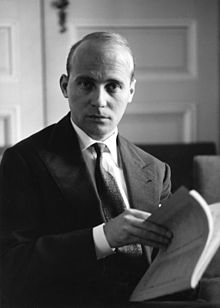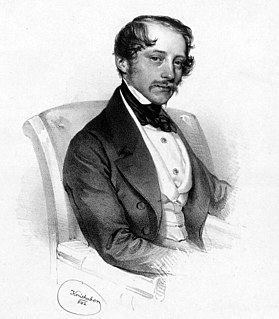
The Merry Wives of Windsor is an opera in three acts by Otto Nicolai to a German libretto by Salomon Hermann Mosenthal based on the play The Merry Wives of Windsor by William Shakespeare.
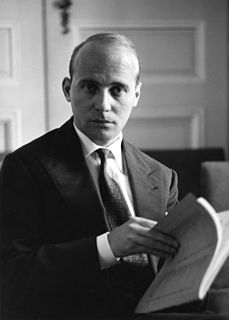
The English Cat is an opera in two acts by Hans Werner Henze to an English libretto by Edward Bond, based on Les peines de coeur d'une chatte anglaise by Honoré de Balzac. The opera was first performed in a German translation by the Stuttgart Opera at the Schlosstheater Schwetzingen at the Schwetzingen Festival on 2 June 1983. The French premiere was at the Opéra-Comique, Paris in 1984. The first performance using the original English text was at Santa Fe on 13 July 1985. The UK premiere was at the Leith Theatre, Edinburgh, on 19 August 1987. A revised version was performed at Montepulciano in 1990 and this was given in London in 1991.

Elegy for Young Lovers is an opera in three acts by Hans Werner Henze to an English libretto by W. H. Auden and Chester Kallman.

The Bassarids is an opera in one act and an intermezzo, with music by Hans Werner Henze to an English libretto by W. H. Auden and Chester Kallman, after Euripides's The Bacchae.

We Come to the River – Wir erreichen den Fluss is an opera by Hans Werner Henze to an English-language libretto by Edward Bond. Henze and Bond described this work as "Actions for music", rather than an opera. It was Henze's 7th opera, originally written for The Royal Opera in London, and takes as its focus the horrors of war. The opera was first performed at the Royal Opera House, Covent Garden, London on 12 July 1976, with the composer as producer, Jürgen Henze as director, and David Atherton conducting. It was subsequently staged at the Deutsche Oper Berlin, and received its first American performance at Santa Fe Opera in 1984, conducted by Dennis Russell Davies.

Das verratene Meer is an opera in two parts and 14 scenes, with music by Hans Werner Henze to a German libretto by Hans-Ulrich Treichel, after Yukio Mishima's novel The Sailor Who Fell from Grace with the Sea. Composed between 1986 and 1989, it was Henze's ninth opera, his third that he wrote for the Deutsche Oper Berlin.

Der Prinz von Homburg is a German-language opera in three acts by Hans Werner Henze with a libretto by Ingeborg Bachmann (1926–1973). It was completed in 1958 but premiered on 22 May 1960 in Hamburg.

Venus und Adonis is a one-act opera by Hans Werner Henze with a German libretto by Hans-Ulrich Treichel, after the poem by William Shakespeare. The work uses singers and dancers.

König Hirsch is an opera in three acts by Hans Werner Henze to a German libretto by Heinz von Cramer after Il re cervo, a theatrical fable (1762) by Carlo Gozzi. He revised it as Il re cervo, premiered in 1963 at the Staatstheater Kassel.

Günther Treptow was a German operatic tenor, best known for Wagner roles.
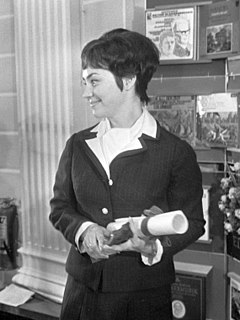
Edith Mathis is a Swiss soprano and a leading exponent of the works of Wolfgang Amadeus Mozart worldwide. She is known for parts in Mozart operas, but also took part in premieres of operas such as Henze's Der junge Lord.
Der Rattenfänger von Hameln is a grand opera in five acts by Viktor Nessler. The German libretto by Friedrich Hofmann is based on a 1875 romantic poem by Julius Wolff about the Pied Piper of Hamelin.
Der Vampyr is an opera in three acts by Peter Josef von Lindpaintner. The German libretto by Cäsar Max Hegel was based on a work by Heinrich Ludwig Ritter, based in turn on a French melodrama by Charles Nodier, Pierre Carmouche and Achille de Jouffroy, ultimately traceable to the short story "The Vampyre" (1819) by John William Polidori, although Lindpaintner's libretto credits, erroneously, Lord Byron.
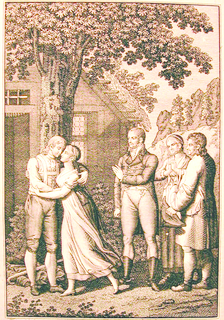
Die Schweizer Familie is an opera by the Austrian composer Joseph Weigl. It takes the form of a Singspiel in three acts. The libretto, by Ignaz Franz Castelli, is based on the vaudeville Pauvre Jacques (1807) by Charles-Augustin de Basson-Pierre, known as Sewrin, and René de Chazet. The opera was first performed at the Theater am Kärntnertor, conducted by the composer, in Vienna on 14 March 1809 and was a great success in German-speaking countries in the early 19th century.

Loren Driscoll was an American tenor who had an active international career from the 1950s through the mid-1980s. Driscoll was particularly noted for his performances in contemporary operas and sang in many world premieres.
Patricia Johnson is an English operatic mezzo-soprano. She made an international career and is known for her dramatic voice and her stage presence. She appeared in leading roles of the repertory, such as Carmen and Eboli, and created new roles, such as the Baronin Grünwiesel in Henze's Der junge Lord, and the Princess in Nicolas Nabokov's Love's Labour's Lost.
Ruth Hesse is a German dramatic mezzo-soprano. She was a member of the Deutsche Oper Berlin from 1962 to 1995, and appeared internationally, including the Bayreuth Festival and the Salzburg Festival. She appeared regularly at the Vienna State Opera from 1965 to 1988, and was appointed an Austrian Kammersängerin in 1982. In Berlin, she took part in the world premiere of Henze's Der junge Lord.
Werner Enders was a German operatic tenor and member of the Komische Oper Berlin.
Vera Pearl Little-Augustithis was an American contralto and mezzo-soprano opera singer who belonged to the ensemble of the Deutsche Oper Berlin for more than four decades. She performed each of the important mezzo-soprano roles of the repertoire, appearing at major international opera houses and festivals. She took part in world premieres of operas by Hans Werner Henze, in 1965 Der junge Lord in Berlin and in 1966 Die Bassariden at the Salzburg Festival.
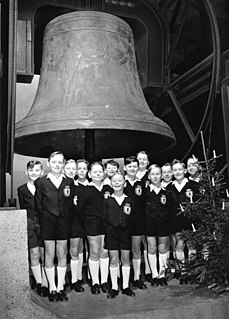
The Schöneberger Sängerknaben were a German boys' choir from Berlin, named after the Bezirk Schöneberg. The choir performed with about 30 boys at a time. They wore short black trousers, black blazers with emblems, white shirts and white knee socks. The repertoire initially included German folk songs, Berlin popular songs and Schlager, later also opera choruses and other classical works.
